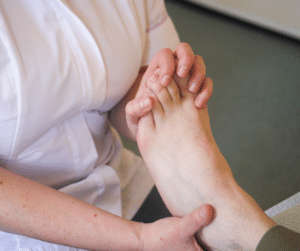
What is Reflexology?
Reflexology is a form of complementary therapy that includes applying pressure to certain spots on the feet, hands, or ears. These points correspond to various organs and systems in the body. Reflex points are thought to be associated with particular energy pathways, and it is believed that stimulating these reflex points can promote healing and balance inside the body.
How Does Reflexology Help Seniors?
As we get older, circulation might become a source of concern. There is a possibility that reflexology can assist in improving blood flow, which is essential for the delivery of oxygen and nutrients to different parts of the body. The symptoms that are connected with inadequate blood flow may be alleviated if circulation is improved, which can contribute to an overall improvement in health.
Reflexology might also help seniors with pain management. Through the stimulation of the production of endorphins, which are the body’s natural painkillers, reflexology is effective in the management of pain. It also can encourage relaxation, which can help reduce stress and discomfort.
In addition, reflexology can be beneficial for reducing feelings of tension and anxiety. As a result of this relaxation reaction, seniors may experience an overall improvement in their sense of well-being as well as a better quality of sleep. The home care team can help seniors with this by encouraging them to use self-reflexology for calming.
The practice of reflexology might also indirectly benefit seniors by enhancing their balance and mobility. This is because it has the potential to improve overall stability and coordination, thereby lowering the chance of falling. This is accomplished by focusing on areas of the feet that are related to balance.
Finally, it is believed that reflexology can help with a variety of health conditions that senior citizens frequently experience. These conditions include digestive troubles, respiratory problems, and hormone abnormalities. Even though it is not a replacement for medical treatment, reflexology may be able to supplement more conventional approaches to healthcare.
Through the use of a natural and holistic approach, reflexology provides seniors with the opportunity to improve their entire well-being. This ancient practice may contribute to increased circulation, pain management, stress reduction, and enhanced balance by targeting specific reflex points.
There is also the possibility that it may help reduce tension. Before adopting reflexology into their wellness routine, seniors must check with their healthcare experts, just as they would with any other alternative therapy. Reflexology is a promising route for seniors who are looking for a gentle and non-invasive way to improve their quality of life. Plus, with self-reflexology techniques, they can take control, which can also give them peace of mind.
With the help of alternative therapies such as these and the support of the medical team, home care, and loved ones, seniors can tackle their health head-on.
If you or an aging loved one are considering Home Care in San Francisco, CA, please contact the caring staff at Aviva In-Home Care today (415) 463-1400
Aviva In-Home Care provides exceptional senior home care in the Bay Area, including San Francisco, Burlingame, San Mateo, Hillsborough, Atherton, Menlo Park, Palo Alto, Berkeley, Lafayette, Orinda, and surrounding areas.
- What You Should Know About Caring For A Parent With Alzheimer’s - May 23, 2025
- How To Help Your Senior Parent Feel Their Best Every Day - May 14, 2025
- Preventing Falls in the Yard - May 6, 2025




